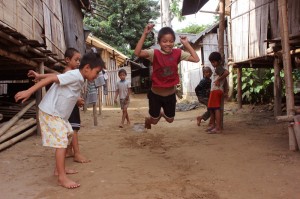A survey conducted by the Karen Refugees Committee at the Tham Hin camp Southern Thailand found that 46 percent of those Karen refugees who were surveyed want to resettle to a third country, another 27% would prefer to remain in Thailand and 27% would only go back to Burma is peace is guaranteed.
 The KRC surveyed 6,195 refugees in the Tham Him camp – three main questions were asked to gauge what refugees wanted to do.
The KRC surveyed 6,195 refugees in the Tham Him camp – three main questions were asked to gauge what refugees wanted to do.
Following the ceasefire agreement between the Karen National Union (KNU) and Burmese government in 2012 questions surrounding the repatriation of refugees has been a constant source of rumor and anxiety for people living in the camps on the Thai Burma border.
The three questions refugees were asked in the survey were – would people return to their homes in Burma if the situation were stable? Would refugees choose to resettle to third countries? And would refugees want to remain in Thailand on the Thai-Burma border?
The result of the survey was that 46% or people replied that they wanted to resettle to a third country, 27% would return to their homes when peace is settled and the political situation is stable and 27% would prefer to live on the Thai-Burma border if the refugee camps no longer existed.
Saw Redmond Bu, head of the Tham Hin refugee committee spoke to Karen News.
“The survey was carried out to find out what the opinion of refugees is, we can pass this onto INGOs. Now they (NGO’s) can know about our opinion and the opinion of refugees [regarding] the repatriation issue.”
Saw Redmond Bu said that the survey provided facts on the repatriation debate and what refugees wanted.
According to The Border Consortium (TBC) there are 129,396 Burma refugees in Thailand most are Karen.
The Tham Hin refugee camp committee estimates that there are 7,952 people living there.
Saw Redmond Bu said that other Karen refugee camps are also conducting their own surveys.
Saw U Maung, a refugee from the Tham Hin camp spoke to Karen News about his reasons for wanting to resettled to a third country.
“I want to resettle. I cannot trust the situation in Burma. We don’t get equal rights. Now we hear that the Burma Army and Wa Army are going to war. There is no peace for the whole of Burma, just bits. If we returned the situation is not stable, and if the Burma Army want to take our land they can take it at any time.”
Saw U Maung, 51, said he would resettle to give his family the chance of a secure life.
”I want my children to have better life and that they don’t have to flee [from conflict]. I want them to go to school.”
Saw U Maung and his family fled in 1997 from Htu Ler village when the Burma Army launched its offensive in their area.
Saw Ki Thu has lived at Tham Hin refugee camp since 1997 and told to Karen News of what he would do if the camp were closed.
“If the refugee camp does not exist anymore we will go back because it is our home and our country. We will return and live with our people. If the situation gets back to normal I will return to my village and help my village to develop, especially with agriculture, and help to improve the village livestock breeding system. I would go back, only if there is a well thought out plan for refugees to return.”
Saw Ki Thu, 48, and his family are from Ka Taw Ni village and fled a Burma Army offensive in 1997.
Naw Ka, from Tham Hin told Karen News that she would stay in Thailand if given the chance.
“I don’t want to resettle, but I want to stay in Thailand. My brothers and sisters are living in Thailand. There are many people who stay in Thailand without documents, so I think I can stay. I don’t want to return to my village. I dare not go back. I am afraid of the Burma Army. The Burma Army is still there in my village. If they were not there, maybe it might be different.”
Naw Ka, 44, and her family are form Htu Ler village and like others at the camp fled a Burma Army offensive in 1997.
Camp leader Saw Redmond Bu said that despite plans to cut refugee food rations the vulnerable would be looked after.
“There is a plan for the reduction of food rations in Tham Hin refugee camp. Refugees who are not well doing and have health problems and other issues will be provided with rations. Currently a refugees gets 19 kilogram of rice a month, but when the rations are reduced they will get 7 to 8 kilogram of rice for a month – less than half”
Redmond Bu said that the reduction of refugee food ration would take place after the wet season in October.



